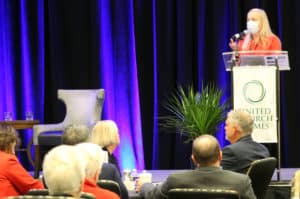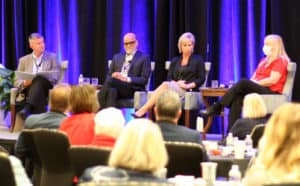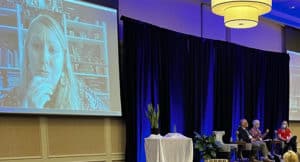United Church Homes Parker Center Symposium Examines Ethical, Spiritual Issues of Developing Tech

More than 125 individuals gathered both in-person or virtually for the United Church Homes (UCH) Seventh Annual Ruth Frost Parker Center for Abundant Aging Symposium, held Sept. 30 at the Nationwide Hotel and Conference Center in Lewis Center, Ohio.
This year’s event, “(Pro) Longevity: The Convergence of Ethics, Technology and Spirituality” featured keynote addresses by Dr. Tracy J. Trothen, professor of ethics at Queen’s University in Ontario, Canada, who is jointly appointed to the university’s School of Religion and School of Rehabilitative Therapy. Her morning and afternoon keynotes raised questions about the social, spiritual, and ethical questions around longevity and technology. Panel discussions following each keynote further unpacked the discussion on the impact of faith and spirituality on technology, future technological innovations, and examining technology through a Christian lens.
In her morning keynote, “Technology and Aging: The Ethical Issues,” Trothen highlighted the advancements in technology — from companion “chat bots” to health care related technological advancements including gene therapy and surgical advances — and asked, “What is the dividing point between a bad technology, an acceptable technology, and a good one?”
“It might be the place at which we cease to value each other. … where we cease to be aware of or care about the effects we have on the environment; where the interconnection of life gets lost,” she said.
Trothen also raised the question of justice. “When we look at justice, we have to look at ageism and ask how ageism affects the use of technology with aging adults, the accessibility (or not) of technology for people who do not have perhaps the same resources,” she added. “Who gets access to these technologies? Who doesn’t?”
From a Christian perspective, Trothen added, and its mandate to love neighbor as self, Trothen posed the question, “What does it mean to love? We need to keep asking that question because it is related strongly to what it means to be better and how we use technology — not just how we use technology, but what technology we choose to create and try to design.”

The opening keynote was following by a panel discussion moderated by the Rev. Dr. Ken Daniel, president and CEO of United Church Homes.
“Dr Trothen introduced questions that helped us think differently about the use of technology and how technology helps or hinders us from being fully human beings,” said the Rev. Beth Long-Higgins, director of the Parker Center. “Ultimately, does our use of any specific technology help us find self-worth and belonging, or does it merely extend life? Are we more concerned about healing or fixing physical deficits, or aware of the value of love as a central ethical axis in the choices we need to make?”
The afternoon keynote was titled “What does Spirituality have to do with it?” The keynote was followed by a second panel discussion, this time moderated by Dr. Susan H. McFadden, PhD., professor emerita of psychology at the University of Wisconsin-Oshkosh. Panelists included the Rev. Dr. Elyse Berry, D.Min., associate for advocacy and leadership development for CHHSM. Prior to her work with CHHSM, Berry was a postdoctoral fellow in advanced bioethics at Case Western Reserve University in Cleveland.
“When I began reflecting on the intersections between spirituality, technology, and ethics, I couldn’t help but wonder how the conversation itself further emphasizes our interdependence,” Berry told participants. Referring to eco-spirituality author Victoria Loorz, Berry explained that until the fourth century, theologians consistently translated the Greek word logos into Latin as sermo, which means “conversation” — the “intimate living of life together, of intimate conversation,” said Berry.

Quoting Loorz, Berry said, “In the beginning was the Conversation, and the Conversation was with God, and Conversation was God … All things came into being through this, and apart from this nothing came into being … and the Conversation became flesh and dwelt among us.”
“If aging well and the use of technology were guided by an ethics of intimate conversation, of weaving life together, I — like Dr. Trothen — wonder what our priorities would be, and who would be a part of that conversation to determine them,” added Berry.
During the symposium, Trothen was awarded the Ruth Frost Parker Center Award for Contributions to Abundant Aging in recognition of her contribution to transforming how we think about aging and her perspective in helping older adults age abundantly while engaging in technology.
Eric Johnson, former fellow through the Dayton (Ohio) Foundation’s Del Mar Encore Fellow Program, also received an award. Johnson was presented with a Special Recognition Award for his establishment of the “Art of Aging” podcast series that explored aging through a variety of different perspectives.”
Attendees left the symposium with much to think about, as the day’s topic applied to their daily lives and their professions. In discussing what was most valuable about the day-long event, “many symposium participants named the importance of ethics, values, and spirituality as the lens through which to evaluate the worth and use of new technologies,” said Kim Moeller, M.Div., the Parker Center’s program and special events coordinator.
The 2023 symposium takes place Oct. 6, 2023, and will explore the effects of stereotypes, prejudice and discrimination about aging on our personal and collective lives.
Join Our Mailing LIst
"*" indicates required fields
